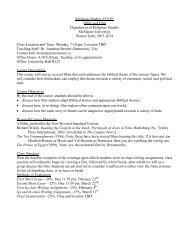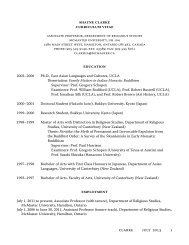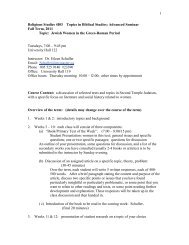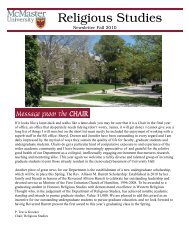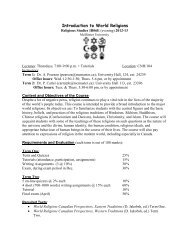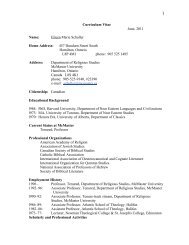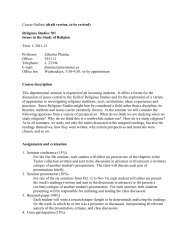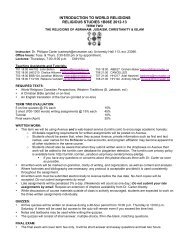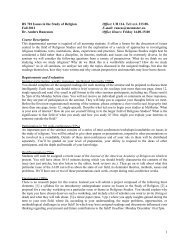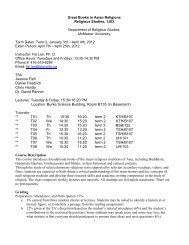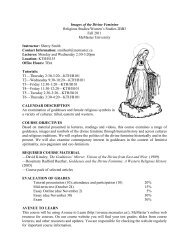Course Outline (PDF) - Department of Religious Studies - McMaster ...
Course Outline (PDF) - Department of Religious Studies - McMaster ...
Course Outline (PDF) - Department of Religious Studies - McMaster ...
You also want an ePaper? Increase the reach of your titles
YUMPU automatically turns print PDFs into web optimized ePapers that Google loves.
<strong>McMaster</strong> University - <strong>Department</strong> <strong>of</strong> <strong>Religious</strong> <strong>Studies</strong><br />
Sanskrit 3A06/RS 6X06 - Introduction to Sanskrit Grammar<br />
Fall/Winter 2012/13<br />
Tuesdays and Thursdays 9:30-11:20 in KTH 109<br />
Instructor: Joseph LaRose<br />
Office: UH B126B<br />
Office hours: Mondays and Thursdays from 14:30-15:30 and by appointment<br />
Email: laroseja@mcmaster.ca<br />
Telephone: (905) 525-9140 x23109<br />
<strong>Course</strong> Description<br />
• Sanskrit 3A06/RS 6X06 is a full-year course in which students are introduced to<br />
Sanskrit grammar, orthography and pronunciation.<br />
• Students will also be introduced to the historical, cultural, linguistic and religious<br />
contexts <strong>of</strong> the language.<br />
• There are no prerequisites and the course does not presuppose any familiarity with<br />
India or Indian languages. All are welcome.<br />
<strong>Course</strong> Objectives - Upon completion <strong>of</strong> this course:<br />
• Students will be able to recognize and understand common grammatical features <strong>of</strong> the<br />
Sanskrit language, e.g., case, number and gender <strong>of</strong> nouns; person, number and tense <strong>of</strong><br />
verbs.<br />
• They will be able to translate simple Sanskrit texts with the aid <strong>of</strong> a grammar and<br />
dictionary.<br />
• Students will be able to read and pronounce Sanskrit in the devanāgarī script.<br />
Required Text (available at Titles Bookstore)<br />
• Goldman, Robert P. and Sally J. Sutherland Goldman. Devavāṇīpraveśikā: an Introduction to<br />
the Sanskrit Language. 3rd Ed. Berkeley: Center for South Asia <strong>Studies</strong>, University <strong>of</strong><br />
California, Berkeley, 2004.<br />
Reading Schedule<br />
• The course is designed to complete 14 lessons <strong>of</strong> the 22 lesson textbook. These chapters<br />
cover the majority <strong>of</strong> Sanskrit grammar and students will be well prepared for the<br />
further study <strong>of</strong> the Sanskrit language at more advanced levels.<br />
• A detailed weekly schedule, including all dates for quizzes and assignments, will be<br />
made available to students at the beginning <strong>of</strong> each term.<br />
• Since the progress <strong>of</strong> the course tends to change each year, the reading schedule may<br />
also change. I will make regular announcements on Avenue to Learn, letting students<br />
know exactly what will be covered in each class. I will also regularly post grammar<br />
resources for students to download, print and bring to class. Students should check the<br />
course page at least every couple <strong>of</strong> days to ensure that they are preparing correctly for<br />
each class.
• Please note that the dates assigned for the writing <strong>of</strong> quizzes and for the submission <strong>of</strong><br />
assignments will not change.<br />
Evaluation<br />
• 4 Quizzes (10% each/40% total) - Twice per term students will write a quiz focused on<br />
current lessons. Since language acquisition is cumulative, the second, third and fourth<br />
quizzes will necessarily include material from previous quizzes.<br />
• 2 Group Translation Assignments (10% each/20% total) - Once per term students will submit<br />
a group translation assignment. These assignments are to be done in groups <strong>of</strong> 2 to 4<br />
people. All members <strong>of</strong> the group will receive the same grade. Detailed instructions for<br />
the completion <strong>of</strong> translation assignments will be handed out with the first assignment.<br />
These instructions will include the specific criteria I will use to evaluate your<br />
translation assignments.<br />
• 2 Exams (15% each/30% total) - At the end <strong>of</strong> each term students will write a registrarscheduled,<br />
instructor-invigilated exam during the regular examination period. As with<br />
quizzes, material covered on these exams will be cumulative.<br />
• Preparation, attendance and participation (10%) - Regular preparation, attendance and<br />
participation are essential for the acquisition <strong>of</strong> any language. During class time I will<br />
present new material, review material, take up lessons, answer questions, etc. Students<br />
are expected to read each lesson carefully and, when scheduled, prepare the exercises<br />
that appear at the end <strong>of</strong> each lesson. Correcting these exercises will be an important<br />
component <strong>of</strong> the class and students will be required to participate in their correction.<br />
Students who do not regularly attend class will lose these important opportunities and<br />
will soon find themselves falling behind in the course. Participation marks will be<br />
assessed on the basis <strong>of</strong> four criteria:<br />
• Attendance - Students are expected to attend all classes. Missed classes will be<br />
excused only with appropriate documentation.<br />
• Active participation - Students are expected to contribute during class. There will be<br />
ample opportunity to ask and answer questions during the course. Some students<br />
might not talk every class, but they should attempt to be regular contributors to<br />
the intellectual life <strong>of</strong> the class.<br />
• General preparedness - Each class will require some preparation, whether that be<br />
reading a lesson <strong>of</strong> the textbook, reviewing notes, or downloading and printing<br />
grammar resources posted on Avenue to Learn. Students are expected to be<br />
prepared for each class.<br />
• Specific preparedness - I will occasionally assign homework to be taken up during<br />
class time. Students are required to participate in the taking up <strong>of</strong> this assigned<br />
work, as I will ask questions relating to the homework to each student in turn.<br />
Late Submission/Missed Tests<br />
• Translation assignments handed in late will be penalized at a rate <strong>of</strong> 5% per day unless<br />
documentation can be provided.<br />
• A test missed as the result <strong>of</strong> a documented absence may be written at a later date.
Student Accessibility Services<br />
• Students who require accommodations should arrange to meet with the instructor as<br />
soon as possible so that appropriate arrangements can be made.<br />
<strong>Course</strong> Website<br />
• Please check the Avenue to Learn page for this course regularly – at least once or twice a<br />
week and especially when you are preparing for class.<br />
University/Faculty/<strong>Department</strong> Statements<br />
1. <strong>Course</strong> Modification Warning<br />
• The instructor and university reserve the right to modify elements <strong>of</strong> the course during<br />
the term. The university may change the dates and deadlines for any or all courses in<br />
extreme circumstances. If either type <strong>of</strong> modification becomes necessary, reasonable<br />
notice and communication with the students will be given with explanation and the<br />
opportunity to comment on changes. It is the responsibility <strong>of</strong> the student to check<br />
his/her <strong>McMaster</strong> email and course websites weekly during the term and to note any<br />
changes.<br />
2. Statement on Academic Integrity (from <strong>McMaster</strong> University website)<br />
• You are expected to exhibit honesty and use ethical behaviour in all aspects <strong>of</strong> the<br />
learning process. Academic credentials you earn are rooted in principles <strong>of</strong> honesty and<br />
academic integrity.<br />
• Academic dishonesty is to knowingly act or fail to act in a way that results or could<br />
result in unearned academic credit or advantage. This behaviour can result in serious<br />
consequences, e.g. the grade <strong>of</strong> zero on an assignment, loss <strong>of</strong> credit with a notation on<br />
the transcript (notation reads: "Grade <strong>of</strong> F assigned for academic dishonesty"), and/or<br />
suspension or expulsion from the university.<br />
• It is your responsibility to understand what constitutes academic dishonesty. For<br />
information on the various types <strong>of</strong> academic dishonesty please refer to the Academic<br />
Integrity Policy, located at http://www.mcmaster.ca/academicintegrity<br />
• The following illustrates only three forms <strong>of</strong> academic dishonesty: 1. Plagiarism, e.g.<br />
the submission <strong>of</strong> work that is not one's own or for which other credit has been<br />
obtained. 2. Improper collaboration in group work. 3. Copying or using unauthorized<br />
aids in tests and examinations.<br />
3. Faculty <strong>of</strong> Social Sciences E-mail Communication Policy<br />
• Effective September 1, 2010, it is the policy <strong>of</strong> the Faculty <strong>of</strong> Social Sciences that all e-<br />
mail communication sent from students to instructors (including TAs), and from<br />
students to staff, must originate from the student’s own <strong>McMaster</strong> University e-mail<br />
account. This policy protects confidentiality and confirms the identity <strong>of</strong> the student.<br />
It is the student’s responsibility to ensure that communication is sent to the university<br />
from a <strong>McMaster</strong> account. If an instructor becomes aware that a communication has<br />
come from an alternate address, the instructor may not reply at his or her discretion.<br />
4. <strong>Department</strong> <strong>of</strong> <strong>Religious</strong> <strong>Studies</strong> Assignment Submission Policy<br />
• Staff in the <strong>of</strong>fice <strong>of</strong> the <strong>Department</strong> <strong>of</strong> <strong>Religious</strong> <strong>Studies</strong> will neither date-stamp nor<br />
receive papers and other assignments. Arrangements must be made with the instructor<br />
for any submission made outside <strong>of</strong> regular class time.
Term 1 Schedule (topics in brackets are indicative, not exhaustive)<br />
Nb. the Term 2 Schedule will be distributed in second term.<br />
Week One:<br />
Thursday, Sept. 6<br />
Week Two:<br />
Tuesday, Sept. 11<br />
Thursday, Sept. 13<br />
Week Three:<br />
Tuesday, Sept. 18<br />
Thursday, Sept. 20<br />
Week Four:<br />
Tuesday, Sept. 25<br />
Thursday, Sept. 27<br />
Week Five:<br />
Tuesday, Oct. 2<br />
Thursday, Oct. 4<br />
Week Six:<br />
Tuesday, Oct. 9<br />
Thursday, Oct. 11<br />
Week Seven:<br />
Tuesday, Oct. 16<br />
Thursday, Oct. 18<br />
Week Eight:<br />
Tuesday, Oct. 23<br />
Thursday, Oct. 25<br />
Week Nine:<br />
Tuesday, Oct. 30<br />
Thursday, Nov. 1<br />
<strong>Course</strong> Introduction; Lesson 1: The Sanskrit Alphabet in Transliteration<br />
Lesson 2: The Devanāgarī Script, Conjunct consonants<br />
Conjunct consonants<br />
Lesson 3: Sandhi, External vowel sandhi<br />
External vowel sandhi, Consonant sandhi<br />
Consonant sandhi<br />
Visarga sandhi<br />
Visarga sandhi, Lesson 3 exercises<br />
Lesson 4: Introduction to Case<br />
Quiz #1 in first hour <strong>of</strong> class time (emphasis on script and sandhi), Case,<br />
a-stem noun paradigms<br />
Adjectives, First and Second-person pronouns<br />
Lesson 4 translation<br />
Lesson 5: Case continued, ā-stem noun paradigms, Third-person pronouns<br />
Demonstrative pronouns, Adjectives <strong>of</strong> pronominal declension<br />
Lesson 5 translation<br />
Lesson 6: Relative/Correlative construction<br />
Translation Assignment #1 due, i- and u-stem noun paradigms,<br />
Relative/Correlative construction<br />
Week Ten:<br />
Tuesday, Nov. 6 Quiz #2 in first hour <strong>of</strong> class time (emphasis on lessons 4 and 5),<br />
Relative/Correlative construction<br />
Thursday, Nov. 8 Indefinite construction<br />
Week Eleven:<br />
Tuesday, Nov. 13<br />
Thursday, Nov. 15<br />
Week Twelve:<br />
Tuesday, Nov. 20<br />
Thursday, Nov. 22<br />
Week Thirteen:<br />
Tuesday, Nov. 27<br />
Thursday, Nov. 29<br />
Lesson 6 translation<br />
Lesson 7: The Gaṇas <strong>of</strong> the Present System<br />
The Thematic gaṇas<br />
Translation Assignment #2 due, The Athematic gaṇas<br />
The Athematic gaṇas, Lesson 7 translation<br />
Lesson 7 translation, Exam review



